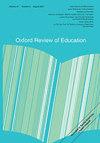幼儿学业前和社交技能:父母控制点与儿童多动症行为的作用
IF 2.1
3区 教育学
Q1 EDUCATION & EDUCATIONAL RESEARCH
引用次数: 0
摘要
摘要一项研究考察了幼儿学业前技能和社交技能与父母控制点和儿童ADHD行为的关系。研究对象为来自4所中国幼儿园的1502名儿童的家长(Mage = 4.59, SD = 0.93;女孩:51.40%)。采用《3 ~ 6岁儿童早期学习与发展》、《父母控制源量表》和《学龄前家庭版ADHD评定量表- iv》分别对儿童学业前技能和社交技能、父母外部控制源和父母内部控制源、儿童注意力不集中和多动/冲动6个领域进行数据采集。层次回归结果显示,在控制其他变量的情况下,父母外部控制源和儿童注意力不集中行为得分较高的儿童在6个领域的得分较低,而父母内部控制源和儿童多动/冲动行为得分较高的儿童在6个领域的得分较高(R2范围为18.0% ~ 47.0%)。值得注意的是,父母控制点对儿童结局的解释差异(1.0-5.0%)小于ADHD行为(5.0-11.0%)。关键词:学龄前儿童adhd控制位点学前技能社交技能披露声明作者未发现潜在的利益冲突。数据可用性声明数据可根据要求从第一作者处获得。补充资料本文的补充资料可在https://doi.org/10.1080/03054985.2023.2268517.Additional info网站上获得。作者anthony Xing Tan是南佛罗里达大学的教育心理学教授。他曾在美国马萨诸塞州剑桥市哈佛大学教育研究生院接受人类发展和心理学培训。Joy Huanhuan Wang是德克萨斯理工大学学校心理学助理教授。她曾在美国佛罗里达州坦帕市南佛罗里达大学教育学院接受学校心理学培训。周毅毕业于美国马萨诸塞州剑桥市哈佛大学教育研究生院幼儿教育专业。邓亚轩(音译)就读于中国深圳南方科技大学统计与数据科学专业本文章由计算机程序翻译,如有差异,请以英文原文为准。
Young children’s pre-academic and social skills: role of parents’ locus of control and children’s ADHD behaviours
ABSTRACTOur study examined young children’s pre-academic and social skills in relation to parental locus of control and children’s behaviours of ADHD. The participants were parents of 1,502 children from four Chinese kindergartens (Mage = 4.59, SD = 0.93; Girls: 51.40%). Data on six domains of children’s pre-academic and social skills, parental external and internal locus of control, and children’s inattention and hyperactivity/impulsivity were obtained with the Early Learning and Development for Children Aged 3 to 6 years, the Parental Locus of Control scale, and the ADHD Rating Scale-IV Preschool Home Version respectively. Hierarchical regression results showed that controlling for other variables, higher scores in parental external locus of control and child inattention behaviours significantly predicted lower scores in all six domains, while higher scores in internal locus of control and child hyperactivity/impulsivity behaviours predicted higher scores in all six domains (R2 ranged from 18.0% to 47.0%). Noticeably, parental locus of control explained a smaller amount of the variance (1.0–5.0%) than behaviours of ADHD (5.0–11.0%) in the children’s outcomes.KEYWORDS: Preschool childrenADHDlocus of controlpre-academic skillssocial skills Disclosure statementNo potential conflict of interest was reported by the authors.Data availability statementData are available from the first author upon request.Supplementary materialSupplemental data for this article can be accessed online at https://doi.org/10.1080/03054985.2023.2268517.Additional informationNotes on contributorsTony Xing TanTony Xing Tan is a Professor of Educational Psychology at the University of South Florida. He was trained in Human Development and Psychology at Harvard Graduate School of Education, Cambridge, MA, USA.Joy Huanhuan WangJoy Huanhuan Wang is an Assistant Professor of School Psychology at Texas Tech University. She was trained in School Psychology at the College of Education, the University of South Florida, Tampa, FL, USA.Yi ZhouYi Zhou was trained in Early Childhood Education at Harvard Graduate School of Education, Cambridge, MA, USA.Yaxuan DengYaxuan Deng studies Statistics and Data Science at the Southern University of Science and Technology, Shenzhen, China
求助全文
通过发布文献求助,成功后即可免费获取论文全文。
去求助
来源期刊

Oxford Review of Education
EDUCATION & EDUCATIONAL RESEARCH-
CiteScore
5.20
自引率
0.00%
发文量
39
期刊介绍:
The Oxford Review of Education is a well established journal with an extensive international readership. It is committed to deploying the resources of a wide range of academic disciplines in the service of educational scholarship, and the Editors welcome articles reporting significant new research as well as contributions of a more analytic or reflective nature. The membership of the editorial board reflects these emphases, which have remained characteristic of the Review since its foundation. The Review seeks to preserve the highest standards of professional scholarship in education, while also seeking to publish articles which will be of interest and utility to a wider public, including policy makers.
 求助内容:
求助内容: 应助结果提醒方式:
应助结果提醒方式:


